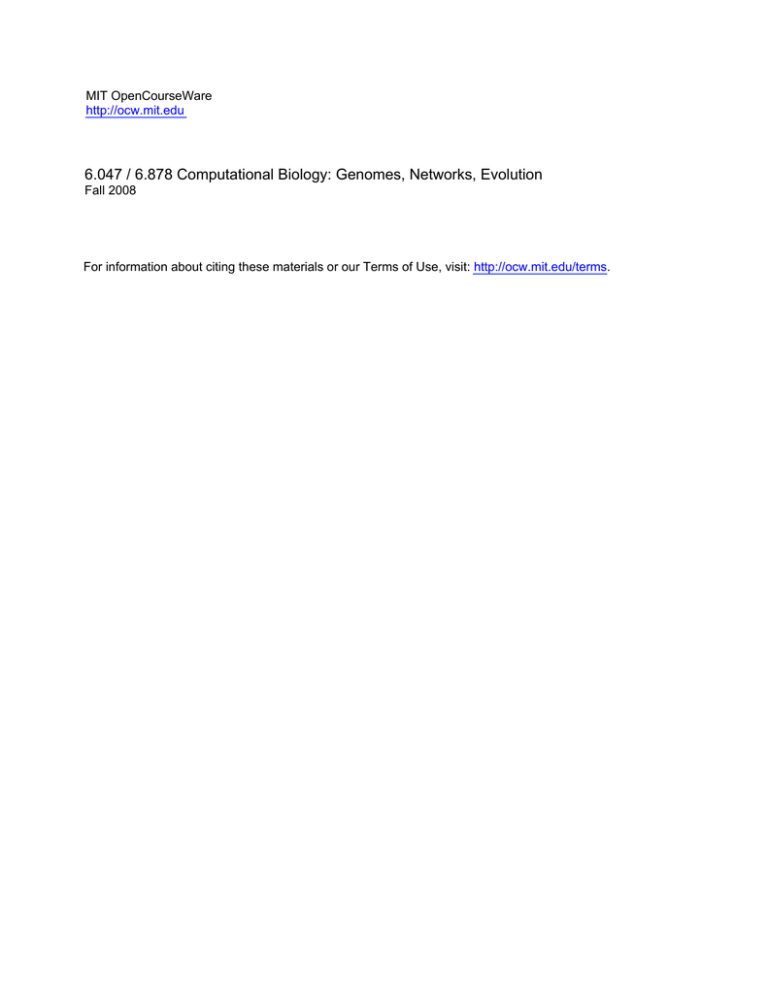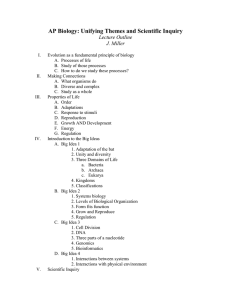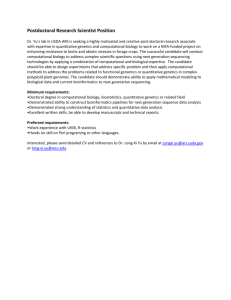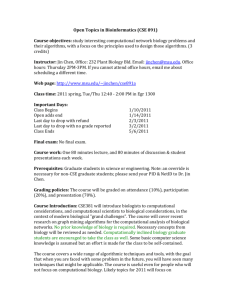6.047 / 6.878 Computational Biology: Genomes, Networks, Evolution MIT OpenCourseWare .
advertisement

MIT OpenCourseWare http://ocw.mit.edu 6.047 / 6.878 Computational Biology: Genomes, Networks, Evolution Fall 2008 For information about citing these materials or our Terms of Use, visit: http://ocw.mit.edu/terms. 6.04716.878 Fall 2008 - Final Project Milestone 1 Due: Monday, November 10, 2008 a t 8pm Project Proposal By now, most of you have already spoken with one of us about your ideas for a final project and received some feedback on feasibility and appropriateness. I f you haven't spoken with any of us, send an email t o the 6.047 staff this week with your topic and project idea. The first milestone of your final project, due this coming Monday, is a formal project proposal, with details on the goals and approach, milestones and deliverables, datasets used and algorithms developed. While we encourage projects that focus on a computational challenge on an important and current biological project, many types o f projects are possible, as long as they include a strong computational component, and a topic at least tangentially related t o the material presented in class. Some general approaches include, but are not limited to: Implement a computational biology algorithm found in the literature, apply i t t o some data set, and evaluate the results. Design and apply a novel computational biology algorithm and evaluate its performance and effectiveness. Carefully analyze, with criticism, corrections and/or improvements, a relevant conference or journal article. There is no specific length requirement for your project proposal, but you must describe your project idea in sufficient detail so that we can evaluate its relevance, scope, and feasibility. Additionally, your proposal should include: 1. Your partner, if any. You may either work independently or with one partner. If you are working with a partner, a division o f labor should be indicated. Partners need only submit one proposal. Please contact us in advance if you are interested in forming a team of more than two people; we may entertain such proposals, but they must undertake commensurately more ambitious projects. 2. Citations t o one or more publications related t o your proposal. 3. A description of how you plan t o obtain any datasets, large-scale computational facilities, or other resources you may need. 4. An example dataset and/or algorithm sketch for project. Identifying a concrete dataset or algorithm is often a good test for project feasibility. We will provide feedback on your proposal, and we may ask you t o submit a revised version. You will give an oral presentation on your project during the last few class meetings, and a written report will be due on the last day of classes. Altogether, the project is 25% of the final grade for the class. 6.047/6.878 Fall 2008 Final Project Milestone 1 Where to get ideas (incomplete list) Journals. Genome Research, PLoS Computational Biology, Bioinformatics, BMC Bioinformatics, Jour­ nal of Computational Biology, Journal of Bioinformatics and Computational Biology, IEEE/ACM Trans­ actions in Computational Biology and Bioinformatics, Journal of Molecular Evolution, Phylogenetics, Nucleic Acids Research, Systems Biology, Journal of Mathematical Biology, Journal of Molecular Biology, Cell, Molecular Cell Biology, Genetics, Nature Genetics, PNAS, Nature, Science. Conferences. RECOMB, ISMB, CSBC, Pacific Symposium on Biocomputing, NIPS, CSHL Genome Biology, CSHL Systems Biology Course materials. In class, lecture slides, textbooks, etc. we have often speculated on alternative or improved approaches. A few projects from past years are available on the course web site. 2





